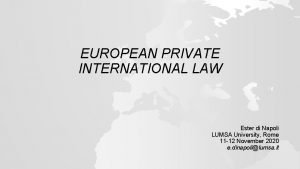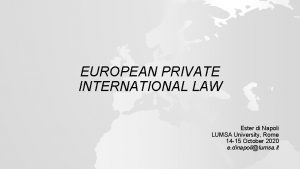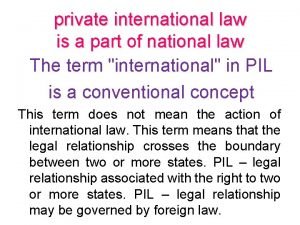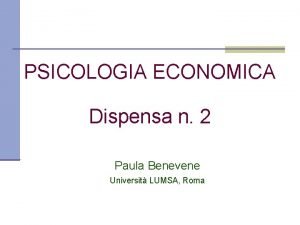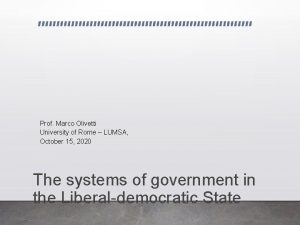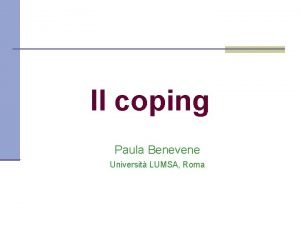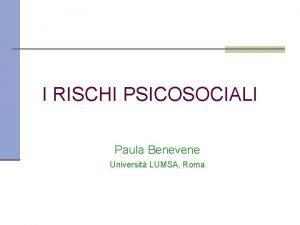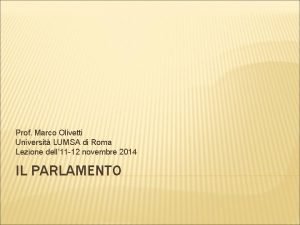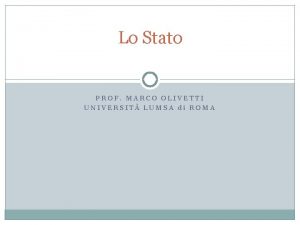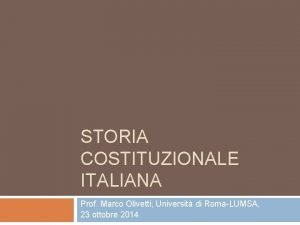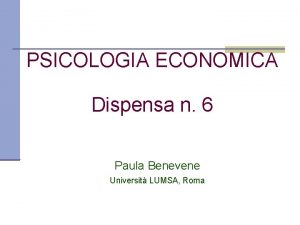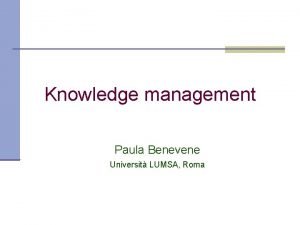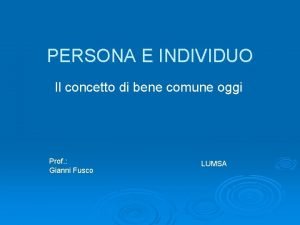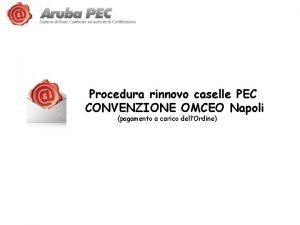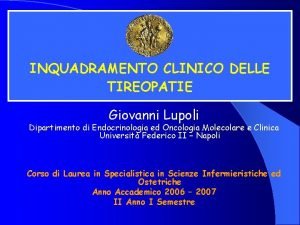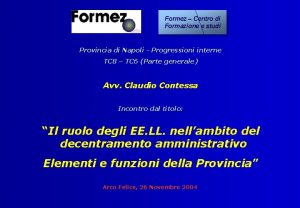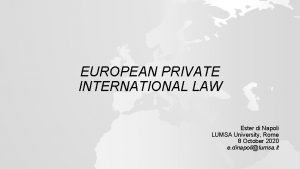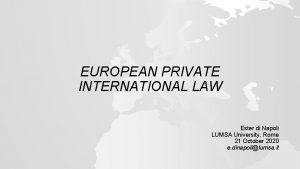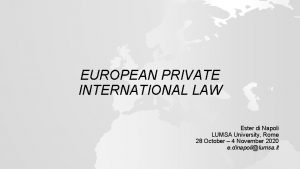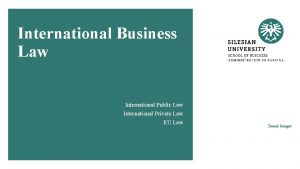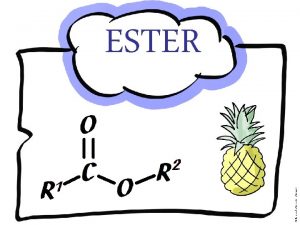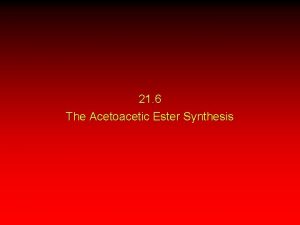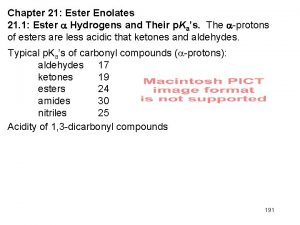EUROPEAN PRIVATE INTERNATIONAL LAW Ester di Napoli LUMSA



























- Slides: 27

EUROPEAN PRIVATE INTERNATIONAL LAW Ester di Napoli LUMSA University, Rome 18 -19 November 2020 e. dinapoli@lumsa. it

REGULATION (EC) N. 864/2007 ON THE LAW APPLICABLE TO NON-CONTRACTUAL OBLIGATIONS Regulation (EC) No 864/2007 of the European Parliament and of the Council of 11 July 2007 on the law applicable to non-contractual obligations (“Rome II” Regulation) It lays down conflict-of-law rules for torts and restitutionary obligations; it is designed to complement EU measures (1980 Rome Convention and its «successor» , Rome I Regulation)

REGULATION (EC) N. 864/2007 ON THE LAW APPLICABLE TO NON-CONTRACTUAL OBLIGATIONS (14) The requirement of legal certainty and the need to do justice in individual cases are essential elements of an area of justice. This Regulation provides for the connecting factors which are the most appropriate to achieve these objectives. Therefore, this Regulation provides for a general rule but also for specific rules and, in certain provisions, for an ‘escape clause’ which allows a departure from these rules where it is clear from all the circumstances of the case that the tort/delict is manifestly more closely connected with another country. This set of rules thus creates a flexible framework of conflict-of-law rules. Equally, it enables the court seised to treat individual cases in an appropriate manner. (15) The principle of the lex loci delicti commissi is the basic solution for non-contractual obligations in virtually all the Member States, but the practical application of the principle where the component factors of the case are spread over several countries varies. This situation engenders uncertainty as to the law applicable.

REGULATION (EC) N. 864/2007 ON THE LAW APPLICABLE TO NON-CONTRACTUAL OBLIGATIONS Uniform rules enhance the foreseeability of court decisions and ensure a reasonable balance between the interests of the person claimed to be liable and the person who has sustained damage. A connection with the country where the direct damage occurred (lex loci damni) strikes a fair balance between the interests of the person claimed to be liable and the person sustaining the damage, and also reflects the modern approach to civil liability and the development of systems of strict liability.

REGULATION (EC) N. 864/2007 ON THE LAW APPLICABLE TO NON-CONTRACTUAL OBLIGATIONS: OUTLINE 32 articles: Chapter I: scope of the regulation + definitions Chapter II: specifies the conflict-of-law rules which apply to torts (arts. 4 -9) Chapter III: specifies the conflict-of-law rules which apply to restitutionary obligations (arts. 10 -13) Chapter IV: choice-of-law of the parties by agreement Chapters V and VI: rules applying both to torts and restitutionary obligations Chapter VII: final provisions

REGULATION (EC) N. 864/2007 ON THE LAW APPLICABLE TO NON-CONTRACTUAL OBLIGATIONS Material scope of application: non-contractual obligations in civil and commercial matters (no revenue, customs, administrative matters, nor the liability of the State of acts and omissions in the excercise of State authority – acta iure imperii) Substantive scope and provisions should be consistent with the Brussels I Regulation and the instruments dealing with the law of contractual obligations (1980 Rome Convention and Rome I Regulation)

REGULATION (EC) N. 864/2007 ON THE LAW APPLICABLE TO NON-CONTRACTUAL OBLIGATIONS Territorial scope of application - universal application Article 3: «Any law specified by this Regulation shall be applied whether or not it is the law of a Member State» Article 31 (Application in time) : «This Regulation shall apply to events giving rise to damage which occur after its entry into force»

REGULATION (EC) N. 864/2007 ON THE LAW APPLICABLE TO NON-CONTRACTUAL OBLIGATIONS Judment of 11 November 2011: Case C-412/10, Deo Antoine Homawoo, v GMF Assurances SA: the regulation in «Applicable from 11 January 2009» ; Article 31 of Regulation No 864/2007, entitled ‘Application in time’, provides that it applies to events giving rise to damage which occur after its entry into force and Article 32, entitled ‘Date of application’, provides that it applies from 11 January 2009. However, for want of a specific provision fixing the date for the entry into force of the regulation, that date must be determined in accordance with the general rule laid down in the third subparagraph of Article 297(1) TFEU. The regulation having been published in the Official Journal of the European Union on 31 July 2007, it entered into force on 20 August 2007, that is to say, the 20 th day following that of its publication. In those circumstances, Article 31 of that regulation may not be interpreted without account’s being taken of the date of application laid down in Article 32 of that regulation, that is to say, 11 January 2009 t is the only interpretation that ensures, in accordance with recitals 6, 13, 14 and 16 of the regulation, the full attainment of the regulation’s objectives, that is to say, the predictability of the outcome of litigation, legal certainty as to the law applicable and the uniform application of that regulation in all the Member States. By contrast, those objectives would be likely to be compromised if the Regulation were to be applied to events occurring between its entry into force and the date set by Article 32.

REGULATION (EC) N. 864/2007 ON THE LAW APPLICABLE TO NON-CONTRACTUAL OBLIGATIONS - OTHER EU LEGISLATION Article 27: Relationship with other provisions of Community Law (Recital 35: «A situation where conflict-of-law rules are dispersed among several instruments and where there are differences between those rules should be avoided. This Regulation, however, does not exclude the possibility of inclusion of conflict-oflaw rules relating to non-contractual obligations in provisions of Community law with regard to particular matters. … proper functioning of the internal market in so far as they cannot be applied in conjunction with the law designated … Directive 2000/31/EC of the European Parliament and of the Council of 8 June 2000 on certain legal aspects of information society services, in particular electronic commerce, in the Internal Market (Directive on electronic commerce)» .

REGULATION (EC) N. 864/2007 ON THE LAW APPLICABLE TO NON-CONTRACTUAL OBLIGATIONS - OTHER EU LEGISLATION Article 28: Relationship with existing international conventions “ 1. This Regulation shall not prejudice the application of international conventions to which one or more Member States are parties at the time when this Regulation is adopted and which lay down conflict-of -law rules relating to non-contractual obligations. 2. However, this Regulation shall, as between Member States, take precedence over conventions concluded exclusively between two or more of them in so far as such conventions concern matters governed by this Regulation”.

REGULATION (EC) N. 864/2007 ON THE LAW APPLICABLE TO NON-CONTRACTUAL OBLIGATIONS - OTHER EU LEGISLATION Hague Convention of 4 th May 1971 on the Law Applicable to Traffic Accidents: https: //www. hcch. net/en/instruments/conventions/fulltext/? cid=81 (see here the status table); Hague Convention of 2 nd October 1973 on the Law Applicable to Products Liability: https: //www. hcch. net/en/instruments/conventions/fulltext/? cid=84 (see here the status table)

REGULATION (EC) N. 864/2007 THE MAIN RULES «Non-contractual obligations» should be understood as an autonomous concept Article 4 establishes a general rule: “ 1. Unless otherwise provided for in this Regulation, the law applicable to a non-contractual obligation arising out of a tort/delict shall be the law of the country in which the damage occurs irrespective of the country in which the event giving rise to the damage occurred and irrespective of the country or countries in which the indirect consequences of that event occur. 2. However, where the person claimed to be liable and the person sustaining damage both have their habitual residence in the same country at the time when the damage occurs, the law of that country shall apply. 3. Where it is clear from all the circumstances of the case that the tort/delict is manifestly more closely connected with a country other than that indicated in paragraphs 1 or 2, the law of that other country shall apply. A manifestly closer connection with another country might be based in particular on a preexisting relationship between the parties, such as a contract, that is closely connected with the tort/delict in question”.

REGULATION (EC) N. 864/2007 THE MAIN RULES Article 4, para. 1: “ 1. Unless otherwise provided for in this Regulation, the law applicable to a non-contractual obligation arising out of a tort/delict shall be the law of the country in which the damage occurs irrespective of the country in which the event giving rise to the damage occurred and irrespective of the country or countries in which the indirect consequences of that event occur. (…)” Law of the place of the direct injury. See also Recital 17 “The law applicable should be determined on the basis of where the damage occurs, regardless of the country or countries in which the indirect consequences could occur. Accordingly, in cases of personal injury or damage to property, the country in which the damage occurs should be the country where the injury was sustained or the property was damaged respectively”.

REGULATION (EC) N. 864/2007 ON THE LAW APPLICABLE TO NON-CONTRACTUAL OBLIGATIONS Court of Justice of the European Union, judgment of 10 December 2015, Florin Lazar, Case C‑ 350/14 “Article 4(1) Regulation (EC) No 864/2007 of the European Parliament and of the Council of 11 July 2007 on the law applicable to non-contractual obligations (‘Rome II’), must be interpreted, in order to determine the law applicable to a non-contractual obligation arising from a road traffic accident, as meaning that the damage related to the death of a person in such an accident which took place in the Member State of the court seised and sustained by the close relatives of that person who reside in another Member State, must be classified as ‘indirect consequences’ of that accident, within the meaning of that provision”.

REGULATION (EC) N. 864/2007 THE MAIN RULES Article 4, para. 2 refers to the connecting factor of the habitual residence of the parties involved. See article 23 which lays down an autonomous interpretation: “ 1. For the purposes of this Regulation, the habitual residence of companies and other bodies, corporate or unincorporated, shall be the place of central administration. Where the event giving rise to the damage occurs, or the damage arises, in the course of operation of a branch, agency or any other establishment, the place where the branch, agency or any other establishment is located shall be treated as the place of habitual residence. 2. For the purposes of this Regulation, the habitual residence of a natural person acting in the course of his or her business activity shall be his or her principal place of business”. no definition of habitual residence for an individual who is not, or not relevantly, engaged in a business activity on his own account.

REGULATION (EC) N. 864/2007 Public policy: article 26 the application … may be refused only if it is manifestly incompatible with the public policy (ordre public) of the forum”. Recital 37 reference to punitive damages Overriding rules: article 16 Nothing in this Regulation shall restrict the application of the provisions of the law of the forum in a situation where they are mandatory irrespective of the law otherwise applicable to the noncontractual obligation. Exclusion of renvoi: article 24 The application of the law of any country specified by this Regulation means the application of the rules of law in force in that country other than its rules of private international law.

REGULATION (EC) N. 864/2007 ENVIRONMENTAL DAMAGE Article 7: “The law applicable to a non-contractual obligation arising out of environmental damage or damage sustained by persons or property as a result of such damage shall be the law determined pursuant to Article 4(1), unless the person seeking compensation for damage chooses to base his or her claim on the law of the country in which the event giving rise to the damage occurred”. Recital 24 «environmental damage» as «adverse change in a natural resource, such as water, land or air, impairment of a function performed by that resource for the benefit of another natural resource or the public, or impairment of the variability among living organisms» .

REGULATION (EC) N. 864/2007 ON THE LAW APPLICABLE TO NON-CONTRACTUAL OBLIGATIONS FORUM = IUS Brussels I bis Regulation, article 7, par. (2): [A person domiciled in a MS may be sued in another MS “in matters relating to tort, delict or quasi-delict, in the courts for the place where the harmful event occurred or may occur”. Rome II Regulation, article 4: “…law of the country in which the damage occurs”

PRACTICAL CASE Alfred is the legal representative of Magic Cleanser Ltd, a company with registered head offices in the UK. On 12 January 2009, coming back from Ferrara after a delivery, one of the company’s tanks, full of solvents discharges its contents in the Swiss side of the river Rhine. The blue chemical substances, brought by the current, quickly spread throughout the territory touched by the river, in France, Germany, and the Netherlands. Anna owns three farms based in Switzerland, France and The Netherlands. Her fields - mainly the French ones - are highly damaged by Alfred’s company.

QUESTIONS Where can Anna sue Magic Cleanser Ltd? Which law would apply? Explain your EU PIL reasoning to your client

EU PRIVATE INTERNATIONAL LAW IN FAMILY MATTERS Reference texts (selected pages only): P. Stone, EU Private International Law, Edward Elgar Publishing, 2014, third edition: Chapter 17 “Matrimonial proceedings”, pp. 419 - 440. Some data in the EU: More than 16 million of “international couples” (EU Commission) Among 2, 4 million, 13 % marriages celebrated features an international element (20 % civil partnerships – 21. 000 out of 211. 000) 140. 000 “international divorces” per year 1. 800 international child abductions per year

EU PRIVATE INTERNATIONAL LAW IN FAMILY MATTERS Family law – a matter falling under Member States’ sovereignty (picture of a given State in a certain moment) TFEU, Chapter 3 – Judicial cooperation in civil matters: Article 81 (ex Article 65 TEC) “ 1. The Union shall develop judicial cooperation in civil matters having crossborder implications, based on the principle of mutual recognition of judgments and of decisions in extrajudicial cases. Such cooperation may include the adoption of measures for the approximation of the laws and regulations of the Member States.

EU PRIVATE INTERNATIONAL LAW (EU PIL) IN FAMILY MATTERS “ 2. For the purposes of paragraph 1, the European Parliament and the Council, acting in accordance with the ordinary legislative procedure, shall adopt measures, particularly when necessary for the proper functioning of the internal market, aimed at ensuring: (a) the mutual recognition and enforcement between Member States of judgments and of decisions in extrajudicial cases; (b) the cross-border service of judicial and extrajudicial documents; (c) the compatibility of the rules applicable in the Member States concerning conflict of laws and of jurisdiction; (…)

EU PRIVATE INTERNATIONAL LAW (EU PIL) IN FAMILY MATTERS 3. Notwithstanding paragraph 2, measures concerning family law with crossborder implications shall be established by the Council, acting in accordance with a special legislative procedure. The Council shall act unanimously after consulting the European Parliament. The Council, on a proposal from the Commission, may adopt a decision determining those aspects of family law with cross-border implications which may be the subject of acts adopted by the ordinary legislative procedure. The Council shall act unanimously after consulting the European Parliament. The proposal referred to in the second subparagraph shall be notified to the national Parliaments. If a national Parliament makes known its opposition within six months of the date of such notification, the decision shall not be adopted. In the absence of opposition, the Council may adopt the decision”.

EU PRIVATE INTERNATIONAL LAW IN FAMILY MATTERS “those aspects of family law with cross-border implications” (ex art. 81, par. 3) refers to the following questions (previously known: 1. which court/authority is competent to decide? rules on jurisdiction 2. which law applies? conflict-of-law rules 3. how does the decision circulates in other States different from the State where the decision was rendered? rules on recognition and enforcement 4. how to facilitate “administrative” cooperation among authorities based in different States?

EU PRIVATE INTERNATIONAL LAW (EU PIL) IN FAMILY MATTERS However enhanced cooperation mechanism (article 326 ff. TFEU): - group of MS addressing the request to the EU Commission, specifying the scope and objectives of the enhanced cooperation proposed; - Council authorization; - Authorization to proceed with enhanced cooperation shall be granted by a decision of the Council acting unanimously. Regulation (EU) n. 1259/2010 establishing an enhanced cooperation on the law applicable to separation and divorce proceedings (Rome III regulation).

EU PRIVATE INTERNATIONAL LAW (EU PIL) IN FAMILY MATTERS Fragmented scenario: Regulation (EC) no 2201/2003 on jurisdiction, recognition and enforcement of judgments in matrimonial matters and in matters of parental responsibility (“Brussels II bis” regulation); - regulation (CE) n. 4/2009 on jurisdiction, recognition and enforcement of judgments and law applicable to maintenance obligations; - regulation (EU) n. 1259/2010 on the law applicable to separation and divorce proceedings (“Rome III Regulation”) - regulation (EU) 2016/1103 on matrimonial property regimes; - regulation (EU) 2016/1104 on the property consequences of registered partnerships - regulation (EU) 2016/1191 on promoting the free movement of citizens by simplifying the requirements for presenting certain public documents in the European Union CJEU’s interpretation activity
 Ester di napoli
Ester di napoli Ester di napoli
Ester di napoli Private international law example
Private international law example Private international law definition
Private international law definition Private law vs public law
Private law vs public law Paula psicologia
Paula psicologia Marco olivetti lumsa
Marco olivetti lumsa Strategie di coping
Strategie di coping Benevene lumsa
Benevene lumsa Olivetti lumsa
Olivetti lumsa Olivetti lumsa
Olivetti lumsa Olivetti lumsa
Olivetti lumsa Olivetti lumsa
Olivetti lumsa Paula benevene lumsa
Paula benevene lumsa Paula benevene
Paula benevene Paula benevene lumsa
Paula benevene lumsa Gianni fusco lumsa
Gianni fusco lumsa Newton's first law and second law and third law
Newton's first law and second law and third law Si unit of newton's first law
Si unit of newton's first law V=k/p
V=k/p Constant of avogadro's law
Constant of avogadro's law Crescent valves
Crescent valves Via petrarca 80 napoli
Via petrarca 80 napoli Macchina delle quarantore napoli
Macchina delle quarantore napoli Tavola strozzi
Tavola strozzi Pec lextel napoli
Pec lextel napoli Lupoli primitivo
Lupoli primitivo Formez napoli
Formez napoli
